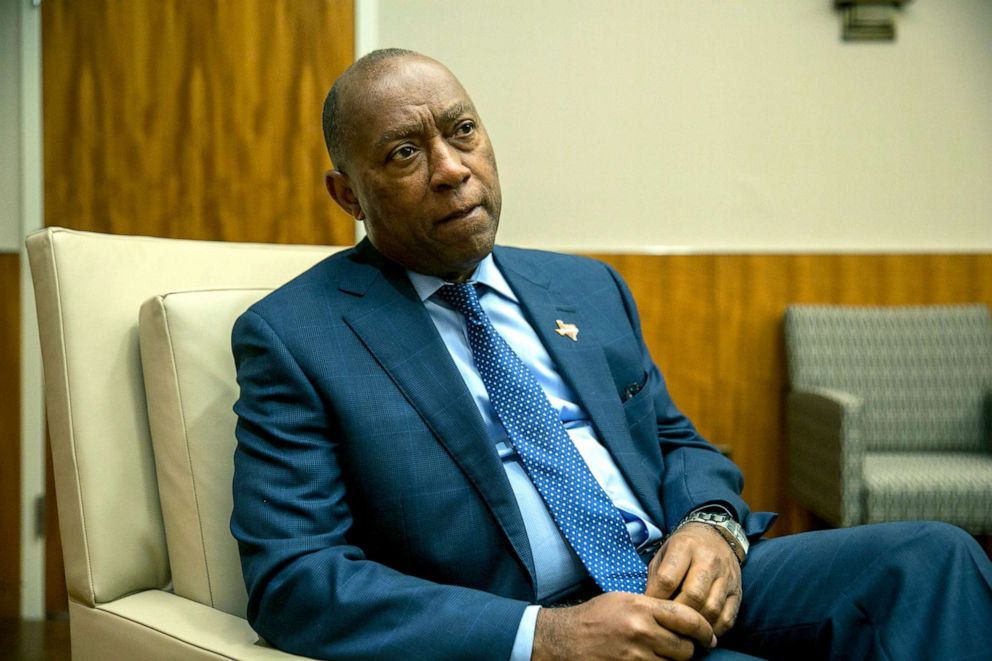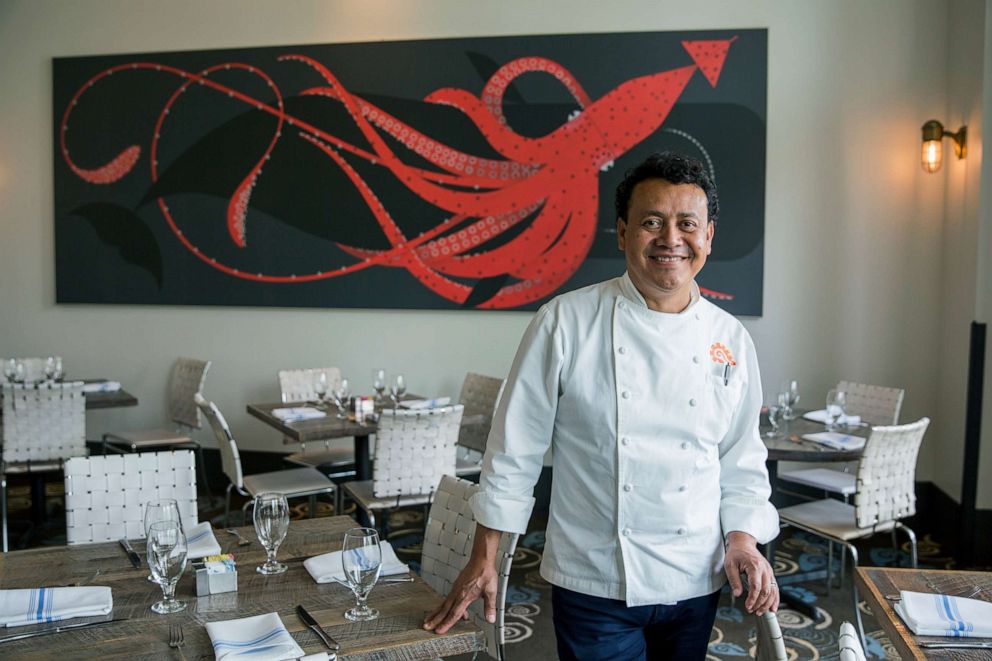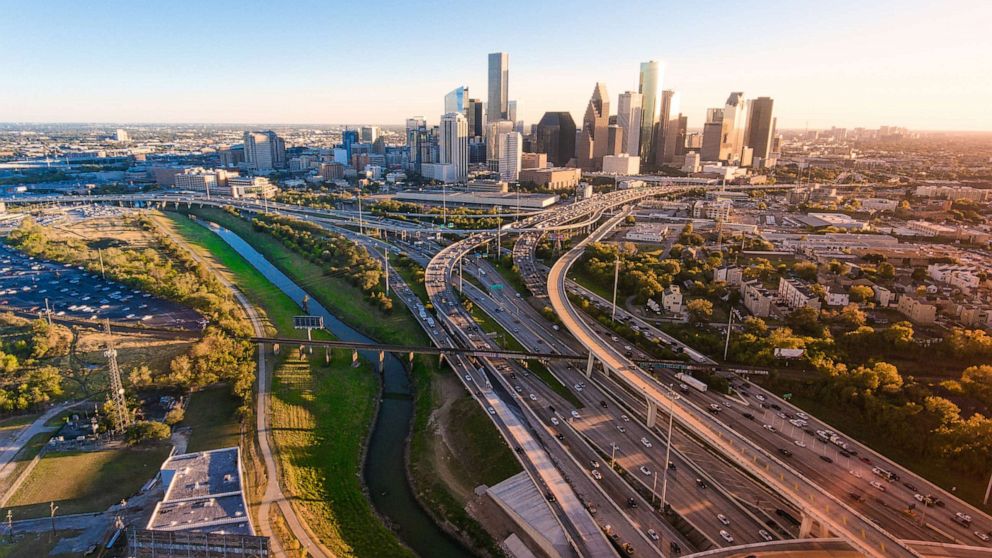How Houston, hosting the 3rd Democratic debate, is a look into America’s future
When Hugo Ortega first came to Houston 35 years ago, traveling from Mexico illegally in the trunk of a car, he found work as a dishwasher in what was then a mostly white city battered by the oil bust of the 1980s.
These days, Houston is the most diverse big city in America and Ortega is among its most celebrated chefs. In many ways, Ortega embodies the practical yet ambitious spirit of the changing city.
As ten presidential candidates arrive in Houston this week for the third round of Democratic debates, Houstonians say they will find America’s future: young, multicultural and, two years after Hurricane Harvey laid waste to parts of this city, reckoning with the very real threat of climate change.
Ahead of the debate on Thursday, hosted by ABC News, Ortega said he hopes the candidates can learn from the city’s welcoming approach to immigration and its pragmatic approach to hot-button issues.
“I came here with no money in my pocket and I crossed the Rio Grande illegally and today I have 500 employees and I am a James Beard Award winner,” said Ortega, who has cooked quesadillas for former President Bill Clinton and served dinner to another former president, George H. W. Bush, and his chief of staff James Baker -- including making an emergency run to procure Bush’s preferred skim milk as coffee was about to be served.
“It’s wonderful to be able to contribute a hundred percent of who you are,” he said. “I will vote for someone who says, ‘I understand my great, great grandfather was an immigrant, and this country is founded on that.’”
With 2.3 million residents, sprawling Houston is the fourth biggest city in the country, while according to the most recent census, close to two-thirds of the population is non-white and a quarter of residents are foreign-born.

“If you want to get a sense of where the United States will be 20, 25 years from now, take a look at Houston,” Sylvester Turner, the city’s Democratic mayor, said in a telephone interview. The U.S. Census Bureau projects non-Hispanic whites will represent a minority of the U.S. population within the next three decades.
Houston’s boom and bust and boom again has tracked with the fortunes of America’s energy sector. During the oil boom of the 1960s and '70s, white men poured into Houston’s to fill jobs in the oil industry and related sectors.
But since 1982, when that boom collapsed, the vast majority of the city's growth has come from African Americans, Latinos and Asians, and the non-Hispanic white population has fallen from two-thirds to one-third in Houston, making it something of a "microcosm of the world,” said Stephen Klineberg, a Houston sociologist who conducts the annual Kinder Institute Houston Area Survey.
"Houston is a logical place to hold this debate in a way it would not have been 25 years ago because it's so much a manifestation of what's happening in America," Klineberg said.
Houston's demographic shift has also changed the city's politics. Since 2005, when the city was mostly split along party lines, it has grown more Democratic and is now reliably blue -- a move that is being seen, though at a far more gradual clip, across Texas.
The state has not elected a Democrat to statewide office since 1994, though in 2018 Democrats picked up two states in the state Senate, and 12 Texas House seats, and made additional gains in local races. Former El Paso Rep. Beto O’Rourke, who will be on the presidential debate stage on Thursday, received more votes than any Democrat has in Texas history when he narrowly lost his challenge to Sen. Ted Cruz.
Changes in Houston have also pushed economic inequality and jobs to the forefront of voters’ minds. While Houston is still known as the “energy capital of the world” and is home to a large share of Texas’ oil and gas-related jobs, well-paying jobs for people without a college education have largely dried up.
A sense of vulnerability has also taken hold in Houston following Hurricane Harvey, which destroyed or damaged some 40,000 homes -- and, according to Klineberg, more than seven in 10 Houstonians say they expect flooding to become more commonplace.
In Harvey's wake, the city has taken a proactive response to climate change and the state's heavy reliance on fossil fuels. Mayor Turner is the co-chair of a group called “Climate Mayors,” and has helped spearhead a national effort to drive down the cost of renewable energy.
At Thursday’s debate, he said he hoped to hear candidates talk about how they can remove bureaucratic hurdles so that cities hit by storms can access promised federal aid more quickly.
But even if Texas is less of the deep-red state it once was, its Democrats bring a Texas flavor to their politics.
"Houston, while at the center of all these changes, remains a laissez-faire, Texas anti-government kind of city," Klineberg said. "So as we move Democratic, we do not necessarily become more enamored of government intervention and government programs."

That sentiment was echoed by Jim “Mattress Mack” McIngvale. Long known as the energetic TV pitchman for his Gallery Furniture retail chain, McIngvale was hailed as a hero after Harvey when he opened some of his stores as makeshift shelters.
McIngvale is Republican-leaning, though he describes himself as “half capitalist and half social worker” and said he hasn’t decided who to support in 2020. But he said he is more interested in hearing about how to bolster the country’s skilled trade workforce and less interested in talk about mitigating climate change.
“I’m a Texan. So I think global warming is a bit overdone,” he said. “The issues are, I want a good job … a good place for their kids to go to school and a vibrant community that supports them without being too onerous.”
But while Houstonians might be thinking about the issues facing them directly, Democrats in the city -- as in the country more broadly -- might be principally interested in which candidate appears most likely to beat President Donald Trump.
“The old adage that all politics is local? Not true. All politics is national,” said Rice University pollster and political science professor Bob Stein. “What you see at every level, even school board races, the strongest issue for voters, especially for Democrats, they just want to know who’s a Trump supporter and who’s a good guy.”
Gina Calanni, a Democrat in the Texas House who defeated a two-term Republican in 2018 in a district won two years earlier by President Trump, said she expects access to high-quality healthcare to be a “pivotal” issue in 2020, especially for female voters outraged by Texas’ refusal to accept $100 billion in federal money to expand Medicaid.
“A lot of women don’t have the luxury of an annual checkup,” said Calanni, who survived a bout with cervical cancer.
As far as what to do after the debate, Mayor Turner suggests they take a page from the late traveler and TV host Anthony Bourdain and head out to Burns Original BBQ to eat red beans, short ends, original sausage and potato salad on the restaurant’s porch.
“Go to a place like that,” he said. “Go in and visit communities where the people won’t be in the audience at the debate … Sometimes, you have to bypass the fundraiser and go to where people live.”
Of course the presidential hopefuls also have the option of heading to one of Ortega’s restaurants, like Hugo’s or Xochi.
“It’s just unbelievable to be part of these iconic times,” the chef said. “I would love to cook for all of them!”




